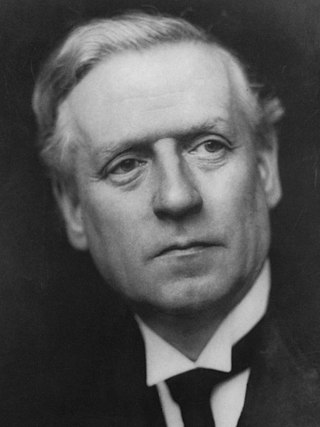Related Research Articles

The 1918 United Kingdom general election was called immediately after the Armistice with Germany which ended the First World War, and was held on Saturday, 14 December 1918. The governing coalition, under Prime Minister David Lloyd George, sent letters of endorsement to candidates who supported the coalition government. These were nicknamed "Coalition Coupons", and led to the election being known as the "coupon election". The result was a massive landslide in favour of the coalition, comprising primarily the Conservatives and Coalition Liberals, with massive losses for Liberals who were not endorsed. Nearly all the Liberal MPs without coupons were defeated, including party leader H. H. Asquith.

The December 1910 United Kingdom general election was held from 3 to 19 December. It was the last general election to be held over several days and the last to be held before the First World War.

The 1892 United Kingdom general election was held from 4 to 26 July 1892. It saw the Conservatives, led by Lord Salisbury again win the greatest number of seats, but no longer a majority as William Ewart Gladstone's Liberals won 80 more seats than in the 1886 general election. The Liberal Unionists who had previously supported the Conservative government saw their vote and seat numbers go down.

The 1886 United Kingdom general election took place from 1 to 27 July 1886, following the defeat of the Government of Ireland Bill 1886. It resulted in a major reversal of the results of the 1885 election as the Conservatives, led by Lord Salisbury, were joined in an electoral pact with the breakaway Unionist wing of the Liberals led by Lord Hartington and Joseph Chamberlain. The new Liberal Unionist party elected 77 members and gave the Conservatives their parliamentary majority, but did not join them in a formal coalition.
The 1929 Liverpool Scotland by-election was a parliamentary by-election held in England on 14 December 1929 to elect a new Member of Parliament (MP) for the British House of Commons constituency of the Scotland division of Liverpool.
South Dublin, a division of County Dublin, was a county constituency in Ireland from 1885 to 1922. It elected one Member of Parliament (MP) to the House of Commons of the Parliament of the United Kingdom, using the first past the post voting system.
Rathmines, a division of County Dublin based on the urban district of Rathmines and Rathgar, was a parliamentary constituency in Ireland. It returned one Member of Parliament (MP) to the House of Commons of the Parliament of the United Kingdom from 1918 to 1922.
The 1940 Queen's University of Belfast by-election was held on 2 November 1940. The by-election was held due to the resignation of the incumbent Ulster Unionist MP, Thomas Sinclair. It was won by the unopposed Ulster Unionist candidate Douglas Savory.
The 1918 Newcastle-upon-Tyne by-election was a parliamentary by-election held on 13 May 1918 for the House of Commons constituency of Newcastle-upon-Tyne in the historic county of Northumberland.
The Manchester South by-election was a Parliamentary by-election held on 5 March 1912. The constituency returned one Member of Parliament (MP) to the House of Commons of the United Kingdom, elected by the first past the post voting system.
The 1914 Londonderry City by-election was a Parliamentary by-election held on 30 November 1914. The constituency returned one Member of Parliament (MP) to the House of Commons of the United Kingdom, elected by the first past the post voting system.
The 1918 East Cavan by-election was a parliamentary by-election held for the United Kingdom House of Commons constituency of East Cavan on 20 June 1918. The election was caused by the death of the sitting member, Samuel Young of the Irish Parliamentary Party.
The 1918 Tullamore by-election was held on 19 April 1918. The by-election was held due to the death of the incumbent Independent Nationalist MP, Edward John Graham. It was won by the Sinn Féin candidate Patrick McCartan, who stood unopposed.
The 1918 East Tyrone by-election was held on 3 April 1918. The by-election was held due to the resignation of the incumbent Irish Parliamentary Party MP, William Redmond. It was won by the Irish Parliamentary candidate Thomas Harbison.
The 1918 Waterford City by-election was held on 22 March 1918.
The 1915 Dublin Harbour by-election was held on 1 October 1915. The by-election was held due to the death of the incumbent Irish Parliamentary Party MP, William Abraham. It was won by the Irish Parliamentary candidate Alfie Byrne.
The 1915 Dublin College Green by-election was held on 11 June 1915. The by-election was held due to the death of the incumbent Irish Parliamentary MP, Joseph Nannetti. It was won by the Irish Parliamentary candidate John Dillon Nugent.